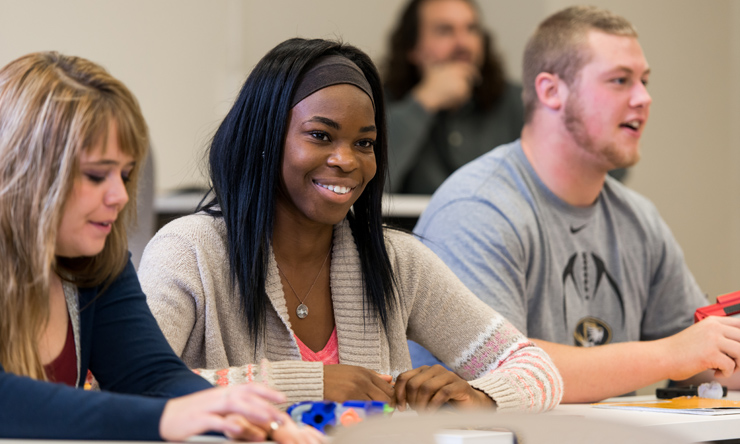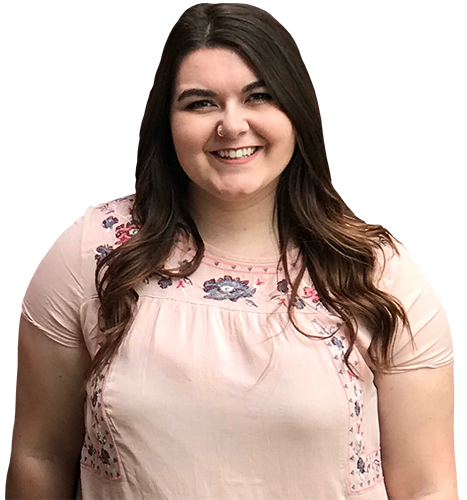English
Whether you strive for a career in teaching, law, writing, library science, or a bevy of other sectors, studying English at St. Ambrose helps you acquire skills and gain opportunities to master your craft.
Our graduates work as English teachers; as writers publishing works of prose and poetry; as lawyers in various sectors of law; as librarians organizing literature and reference material; as content contributors and specialists for websites, and many other sectors of work.
Ambrose Advantages
- Small Class Sizes, Not Lecture Halls
- Caring and Dedicated Faculty
- Read Literature and Learn Writing in Fun and Creative Ways



As an SAU English major, you will explore a wide variety of genres, be guided and challenged by professors and peers, and gain critical thinking, reading, and writing skills that employers covet.
Read our English Major Fact Sheet (pdf)
More Information About Our English Program
English majors develop skills in composition, literature analysis, and critical thinking by studying various authors, genres, and periods. Core courses include British literature, American Literature, and literary studies.
We offer traditional and unique electives so you can shape your degree to your interests. Electives include linguistics, African American literature, fiction into film, Shakespeare, poetry, and many others.
Most of our students choose to complete a second major or minor. Common combinations include English and History; English and Political Science; and English and Philosophy.
Contact us today to arrange a campus visit or chat with an English professor!
At SAU, you can put your growing skills and creativity to use. English majors can:
- Serve on the student advisory board for Quercus, SAU's literary journal for fiction, poetry, and visual art. Read our latest volume.
- Write for the SAU student newspaper, The Buzz
- Study as a Fulbright Scholar
- Join SAU’s Chapter of the Sigma Tau Delta International English Honor Society
Get real-world experience before graduating with an internship. Contact the SAU Career Center. English students have completed internships at print and media outlets; communications and PR firms; nonprofit organizations, and others.
A liberal arts education – along with strong critical thinking, reading, writing, and speaking skills – can lead you into multimedia journalism; English education; law; advertising, marketing, public relations, and communications; and technical writing.
You will also be a strong candidate for graduate studies in education, law, library science, medicine, journalism, and creative writing.
Wait – med school? Absolutely. Majors from the humanities – English is one of them – have a higher acceptance rate (and higher MCAT scores) into medical school than science majors. And the Icahn School of Medicine at Mount Sinai is purposely recruiting students from outside the sciences.
- Anna Badamo '18 is working toward a Master of Educational Leadership and Policy Analysis at the University of Wisconsin in Madison. Click here to read more about Anna's Ambrosian experience.
- Emily Bailey Keimig '16 coordinates Youth Services at LeClaire (Iowa) Community Library.
- Eric Herbst '16 works in marketing for Mississippi Valley Credit Union.
- Livv McDonald '16 is a technical writer at Twin State Technical Services.
Sarah Dennis, PhD, Professor and Chair
Patrick Connelly, PhD, Professor
Emily Kingery, PhD, Assoc. Professor
Philip Goldfarb Styrt, PhD, Asst. Professor
Lindsay Schaefer, Lecturer
Degree Requirements
English majors choose a concentration in either Literature or Creative Writing. Both are 36 credits.
See course descriptions in the online course catalog.
Literature Concentration
Required (18 credits)
WI-ENGL 200 Introduction to Literary Study
+ENGL 201 British Literature I
+ENGL 202 British Literature II
+ENGL 210 American Literature 1
ENGL 211 American Literature II
WI-ENGL 401 Senior Seminar
Electives (18 credits)
Choose 18 credits of ENGL courses, 12 credits of which must be 300-level
Creative Writing Concentration
Required (6 credits)
+ENGL 317 Creative Writing Workshop
+WI-ENGL 415 Advanced Creative Writing
Electives (30 credits)
Choose 21 credits of ENGL courses
+ Satisfies General Education Requirement
WI Writing Intensive
Required:
Two courses from the following:
ENGL 201 British Literature I
ENGL 202 British Literature II
ENGL 210 American Literature I
ENGL 211 American Literature II
Electives:
12 elective credits (6 credits of which must be at least 300 level and one course must be writing intensive (WI) in English or a writing course.)
Required:
EDENGL 230 The Structure & Grammar of English
EDUC 302 Foundations of ESL/Bilingual Education
ENGL 313 Linguistics: Language and Learning
EDENGL 380/580 Teaching English as a Second Language
EDENGL 381/581 Teaching English as a Second Language: Secondary and Post-Secondary Learners
All courses are 3 credits unless otherwise noted.
Choose 18 credits from:
ENGL 199 Creative Forms
WI-ENGL 315 Written Business Communication
+ENGL 316 Expository Writing Workshop
+ENGL 317 Creative Writing Workshop
WI-ENGL 319 Writing About Place
+ENGL 320 Writing Topics
+ENGL 321 Creative Nonfiction
ENGL 350 Independent Study (1-3 credits)
+WI-ENGL 415 Advanced Creating Writing
+ Satisfies General Education requirement
WI writing intensive
Literature Concentration
This is a sample plan of English courses to graduate in four years with a degree in English.
Sophomore
Fall – ENGL 200, ENGL 201 or 210, ENGL elective
Spring – ENGL 202 or 211, ENGL elective
Junior
Fall – ENGL 201 or 210, ENGL elective
Spring – ENGL 202 or 211, 300-level ENGL elective
Senior
Fall – ENGL 401, 300-level ENGL elective
Spring – ENGL elective
Creative Writing Concentration
This is a sample plan of English courses to graduate in four years with a degree in English.
Sophomore
Fall – ENGL 200, ENGL 201 or 210, ENGL elective
Spring – Two ENGL electives
Junior
Fall – Two ENGL electives
Spring – ENGL elective, 300-level ENGL elective
Senior
Fall – ENGL 415, two 300-level ENGL electives
Spring – open
Students seeking licensure in 5-12 (Secondary) English shall fulfill all the requirements for a major in English (Literature Concentration) as well as the licensing requirements in secondary English prescribed by the State of Iowa and implemented by the Educator Preparation Program at St. Ambrose.
For Educator Preparation Program requirements, please visit the Secondary Education page.
Scholarships and Grants
St. Ambrose offers excellent scholarships and grants, work-study and other financial aid options! Full-time students may be eligible based on your strong academic performance in college, your talent in fine arts or athletics or your demonstrated financial need as determined by the Free Application for Federal Student Aid (FAFSA). The SAU school code for the FAFSA is 001889.
ON CAMPUS
Merit-Based Scholarships
4.0 GPA: $24,000
3.75-3.99 GPA: $22,000
3.0-3.749 GPA: $20,000
2.5-2.99 GPA: $18,000
2.0-2.49 GPA: $14,000
If GPA is 2.0-2.49, additional documents and review required for admission.
OFF CAMPUS
Merit-Based Scholarships
4.o GPA: $17,000
3.75-3.99 GPA: $16,000
3.0-3.749 GPA: $15,000
2.5-2.99 GPA: $14,000
2.0-2.49 GPA: $13,000
If GPA is 2.0-2.49, additional documents and review required for admission.
ADDITIONAL INSTITUTIONAL AID
Ambrose Advantage Full-Tuition Scholarship
Pell-eligible Iowa residents, learn more here
Fr. Welch Alumni Scholarship: $500 per year
Parent is a St. Ambrose graduate
Catholic Traditions Scholarship: $1,000 per year
Students with Catholic religious denomination or plans to graduate from Catholic high school
Minority Scholarship: $500 per year
Ethnically diverse student
Athletic Scholarships: varies
Performance and ability
Fine Arts Scholarships: varies
Performance and ability in music, art and theatre
Faith Learning Justice Campus Ministry Scholarships: $2,000 per year
Recognition of involvement in church and community service and interest in strengthening faith and growing as a leader in campus ministry
Scholarships are determined by unweighted GPA, and are renewable for four years of undergraduate student. Increases in scholarship awards due to change in GPA will be reviewed until March 1.
Grants are money that you don't repay, and they can come from government or private sources. SAU receives all financial aid funds directly - including loans and grants - then applies them to your account: once in the fall term and once in the spring term. Grants can be used to cover your tuition, books, and housing costs. You must apply for grants each academic year. If you have any loan funds in excess of your costs, you may receive a refund. If you are a first-time borrower, there is a 30-day hold on your first disbursement. For all of these grants, you must complete the Free Application Free Application for Federal Student Aid (FAFSA) as soon as it is available.
Iowa Tuition Grant
To be eligible for the Iowa Tuition Grant, you must be a resident of Iowa as defined by the State Board of Regents and currently enrolled or planning to enroll in an undergraduate degree program at an eligible Iowa college or university (SAU is eligible). Iowa College Aid administers need-based college financial aid for Iowans, such as the Iowa Tuition Grant.
Award: $7,500 maximum
Federal Pell Grant
Awarded to students of the highest need based on how much your family can contribute to your education. The U.S. Department of Education sets a threshold. Then, when you file your Free Application for Federal Student Aid (FAFSA), it computes where you land within that threshold and determines if you qualify for the grant and for how much.
Award: $6,895 maximum
Federal Supplemental Education Opportunity Grant (FSEOG)
You must file a FAFSA to qualify for a Pell Grant. This grant is awarded on a first-come, first-served basis to students who have submitted all required documents for review and in time for the review to be complete. If you are eligible for a Pell Grant or SEOG, the awards will appear on your financial aid award letter.
Award: $400 maximum
Federal Work Study
Must secure campus employment.
Award: $2,560
Federal Teacher Education Assistance for College and Higher Education (TEACH) Grant
Provides aid to students intending to teach in a high-need field at a school that serves low-income families (as determined by the U.S. Department of Education or a state education agency). Review criteria and all details here.
Award: up to $4,000
There are many opportunities to receive scholarships from outside sources, here are a few websites to begin researching your options:
- Fastweb
- College Board Scholarship Search
- Scholarships.com
- Peterson's Award Database
- Scholly (app download)
Another tip: Next time you're on campus, check out the bulletin board outside Student Financial Services where we post more flyers and applications for outside scholarships.


Anna Badamo
BA in English and Psychology,Class of 2018
Anna's Ambrosian experience made a life-changing impact. Personal attention, opportunities galore, and the freedom to shape her education to her goals led her to graduate with honors, as well as deep confidence in her abilities and dreams. This is what makes a St. Ambrose education remarkable.
Contact
Sarah Dennis, PhD, Department Chair
English Department
Ambrose Hall, 322A
518 W. Locust St.
Davenport, IA 52803
563-333-6100
DennisSarahE@sau.edu
